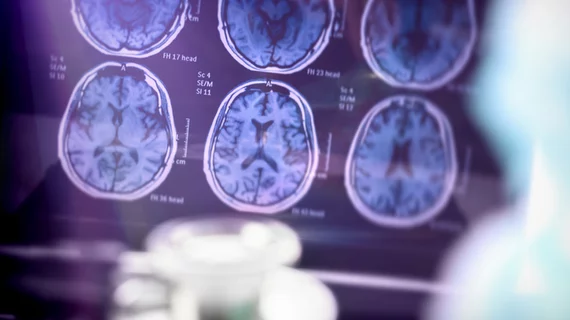AI aids coma prognostics, potentially averting withdrawal of care
Deep learning has bested experienced neurosurgeons at predicting poor outcomes, including mortality, among patients admitted comatose with severe traumatic brain injuries (TBIs).
The work was conducted at the University of Pittsburgh Medical Center and published online April 26 in Radiology.
Co-lead authors Matthew Pease, MD, and Dooman Arefan, PhD, with co-senior authors Shandong Wu, PhD, David Okonkwo, MD, PhD, and colleagues, trained their algorithms on data from 537 TBI patients admitted to UPMC in comatose condition over a 16-year period ending in 2018. The training data incorporated clinical notations as well as head CT imaging.
Tracking outcomes at six months post-admission, the team found their models performed well not only with an internal test set of 500 UPMC patients but also with an external set from 220 patients cared for at 18 centers across the U.S.
Working with the internal data, AI scored 0.92 AUC for predicting six-month mortality and 0.88 for six-month unfavorable outcomes. With the external data, the approach proved about equal at predicting six-month mortality with a widely used prognostic calculator—IMPACT, for the International Mission on Prognosis and Analysis of Clinical Trials in TBI.
However, the AI clearly outperformed onsite attending neurosurgeons, leading the researchers to emphasize “important insights” in their discussion section.
“The most experienced neurosurgeon had the lowest accuracy for mortality prediction but the highest accuracy for unfavorable outcome prediction, which reflects the difficulty and qualitative nature of the predictions made by human experts,” the authors wrote.
Further:
"To guide decisions about life-saving surgery, neurosurgeons must make critical clinical decisions as to whether a patient can survive an injury. Our models showed improved accuracy compared with the predictions of the neurosurgeons, suggesting that our model may improve TBI prognostication over the qualitative assessments made by neurosurgeons. After thorough validation, our model could provide quantitative prognostic information to better enable neurosurgeons to make rapid, reproducible and more accurate decisions to guide the care of patients with severe TBI.”
In coverage by UPMC’s news operation, Okonkwo, a neurosurgeon, suggests it’s not uncommon for hospitals to withdraw care from comatose patients who, in fact, may have a chance to gradually return to independent living.
“The majority of people who survive a critical period in an acute care setting make a meaningful recovery—which further underscores the need to identify patients who are more likely to recover,” Okonkwo says.
Wu, a radiologist, bioengineer and bioinformaticist, adds that the need is great for “better quantitative tools to help intensive care neurologists and neurosurgeons make more informed decisions for patients in critical condition. This collaboration with Dr. Okonkwo’s team gave us an opportunity to use our expertise in machine learning and medical imaging to develop models that use both brain imaging and other clinically available data to address an unmet need.”
More TBI Imaging Coverage:
Artificial intelligence shows promise predicting patients’ need for CT after traumatic brain injury
Researchers see value in performing MRI scans following a TBI
Reference:
Matthew Pease, Dooman Arefan, Jason Barber, Esther Yuh, Ava Puccio, Kerri Hochberger, Enyinna Nwachuku, Souvik Roy, Stephanie Casillo, Nancy Temkin, David O. Okonkwo, Shandong Wu, “Outcome Prediction in Patients with Severe Traumatic Brain Injury Using Deep Learning from Head CT Scans.” Radiology, April 26, 2022. DOI: doi.org/10.1148/radiol.212181

